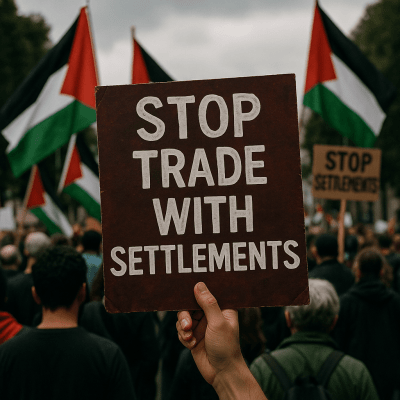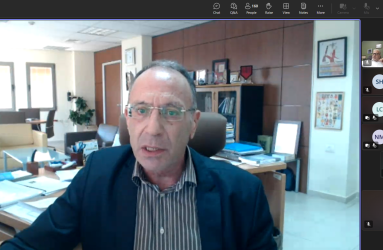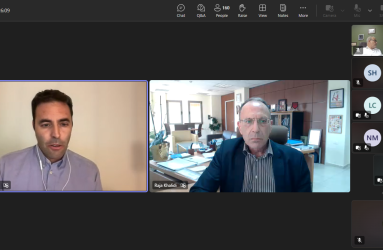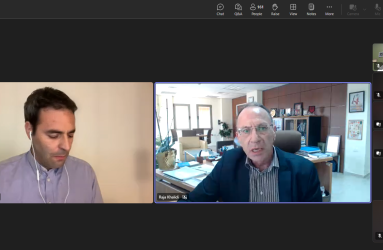MAS Joins International Campaign: Stop Trade with Settlements
Press Release
The campaign focuses on companies that trade with Israeli settlements.
On Monday, September 15, 2025, an alliance of more than 80 global civil society organizations, including the Palestine Economic Policy Research Institute (MAS), launched an unprecedented advocacy campaign “Stop Trade with Settlements”. The campaign focuses on demanding that states ban trade with illegal Israeli settlements in the occupied Palestinian territory (oPt), together with major multinational companies and financial institutions sustaining the settlement enterprise.
The campaign is underpinned by the newly released report “Trading with Illegal Settlements: How Foreign States and Corporations Enable Israel’s Illegal Settlement Enterprise”, which highlights how foreign states and corporations, through ongoing trade with illegal settlements, directly enable the humanitarian crisis driven by Israel’s prolonged occupation.
The campaign and report launch were taken up during a webinar today attended by numerous international economic experts and stakeholders. The event featured Independent Irish Senator Frances Black, who has led on legislation in the Irish Parliament to ban trade with the illegal Israeli settlements, now supported by both Government and opposition, as Keynote Speaker. Panelists included Sami Huraini (Community Activist from Masafer Yatta), Raja Khalidi (Director General of MAS), and Ziad Anabtawi (Palestinian Exporter of Agricultural Products). The webinar was moderated by Eitan Diamond, Manager and Senior Legal Expert, International Humanitarian Law Centre (Diakonia).
The campaign targets settlement trade specifically because of Israel’s ongoing and escalating oppression of Palestinians in the West Bank (including East Jerusalem), fragmentation of its economy, and undermining of the viability of a future Palestinian state. Ending trade with settlements is a necessary step to uphold human rights, protect Palestinian livelihoods, stop Israel’s settlement expansion, and end the unlawful occupation.
Over the last four years, Israel has significantly accelerated its settlement activities in the West Bank, including East Jerusalem, marking a staggering increase in both settlement construction and land appropriation.
Recent new settlement construction approvals surpassed previous records and marked the highest level of settlement expansion since the Oslo Accords (1993-1995). Most of these approvals were granted for settlements located “deep into the West Bank”, further fragmenting Palestinian territory and dashing any prospects for a viable and contiguous Palestinian economy and state . The revival of the ‘E1’ plan – frozen since 2012 amid widespread international opposition – approving construction of 3,400 new housing units in a bloc connecting East Jerusalem and the Ma’ale Adumim settlement, is effectively cutting off Palestinian movement between the northern and southern West Bank.
MAS DG Khalidi emphasized in the webinar the importance of the campaign in highlighting how Palestinian communities and the national economy are affected by the settlement economy and how policies such as ending investment in and trade with it can help push back against the relentless expansion of that enterprise. He added “the goal today is not holding Israel accountable for the economic and material destruction is has wrought over decades through its occupation, settlement project, or the current genocidal war. It is however about protecting Palestinians.”
The advisory opinion issued by the International Court of Justice (ICJ) in July 2024 makes it clear: Governments allowing trade with the settlement economy are complicit in the maintenance and expansion of illegal Israeli settlements and thus in sustaining Israel’s illegal occupation of Palestinian territory.
Campaigners say that trade with settlements only serves to legitimize them, despite them being illegal under international law and a barrier to peace. Israel’s control costs the Palestinian economy billions of dollars a year while poverty in the West Bank has risen from 12 to 28% in the past two years, with a recorded unemployment rate of 35% (doubled since October 2023).
Israel attracts business investment into its settlements across the West Bank, including East Jerusalem, via incentives such as cheap land leases, subsidies for technology and wages, tax breaks, and cash grants. The EU remains Israel's largest trade partner accounting for roughly 32% of its overall trade in goods, with a total trade volume amounting to €42 billion per year. The UK is one of Israel's largest European trade partners worth just under £6 billion a year.
Campaigners insist that countries particularly in the EU and the UK explicitly ban trade with Israeli settlements, including the provision of services and investments. Israeli exporters must determine the origins of goods and be held accountable for false claims. Banks and financial institutions should be barred from providing loans and credit to settlement-based corporations that fund settlement projects.




